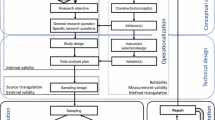Abstract
Can children and teenagers be taught to look upon science as a way of life? The basic research methodology and the common problems and errors encountered by the author while designing and doing science projects for the National Children’s Science Congress (A DST-Govt. of India initiative) is discussed in this article.
Similar content being viewed by others
Suggested Reading
Activity Guide, Planet Earth-Our Home: Explore, Share and Care, 16th National Children’s Science Congress 2008, NCSTC-Network, New Delhi, Government of India, pp.IX–XII, 2008.
R Louv, Last Child in the Woods: Saving Our Children From Nature-Deficit Disorder, Chapel Hill, NC, USA, 2005.
J M Healey, Early television exposure and subsequent attention problems in children, Pediatrics, Vol.113, No.4, pp.917–918, 2004.
R Kraut, V Lundmark, M Patterson, S Kiesler, T Mukopadhyay and W Scherlis, Internet paradox: A social technology that reduces social involvement and psychological well-being?, American Psychologist, Vol.53, No.9, pp.1017–1031, 1998.
C Darwin, On the Origin of Species by Means of Natural Selection, John Murray, London, 1859.
R M Henig, The Monk in the Garden: The Lost and Found Genius of Gregor Mendel, The Father of Genetics, Boston: Houghton Mifflin, 2000.
K Popper, The Logic of Scientific Discovery, Hutchinson & Co, New York, 1959.
R Gadagkar, The Social Biology of Ropalidia marginata: Toward Understanding the Evolution of Eusociality, Harvard University Press, Cambridge, Massachusetts, USA, 2001.
N B Davies, M de L Brooke, Cuckoos versus reed warblers: Adaptations and counteradaptations, Animal Behaviour, Vol.36, No.1, pp.262–284, 1998.
M Paul and A Bhadra, Selfish pups: Weaning conflict and milk theft in freeranging dogs, PLoS One, Vol.12, No.2, p.e0170590, 2017.
M Paul, S S Majumder, and A Bhadra, Selfish mothers? An empirical test of parent-offspring conflict over extended parental care, Behavioural Processes, Vol.103, pp.17–22, 2014.
K S Manja, M S Maurya and K M Rao, A simple field test for the detection of faecal pollution in drinking water, Bulletin of the World Health Organization, Vol.60, pp.797–801, 1982.
F W Dyson, A S Eddington and C Davidson, A determination of the deflection of light by the Sun’s gravitational field, from observations made at the total eclipse of May 29, 1919, Philosophical Transactions of the Royal Society A: Mathematical, Physical and Engineering Sciences, Vol.220, pp.571–581, 1920.
A Dey and P S Chaudhuri, Earthworm community structure of pineapple (Ananas comosus) plantations under monoculture and mixed culture in West Tripura, India, Tropical Ecology, Vol.55, No.1, pp.1–17, 2014.
S Mahanti, A Perspective on Scientific Temper in India, Journal of Scientific Temper Vol.1, No.1, pp.46–62, 2013.
Acknowledgement
My heartfelt thanks to Professor P. S. Chaudhuri, Department of Zoology, Tripura University, for reading the manuscript and giving valuable critical comments and suggestions for enriching it.
Author information
Authors and Affiliations
Corresponding author
Additional information
Sourabh Chakraborty is a postgraduate teacher at Ramakrishna Mission Vidyalaya, Viveknagar, Tripura. He holds a PhD in zoology from Tripura Central University. His is interested in earthworm ecology and animal behaviour research. He is passionate about encouraging children and teenagers to understand, appreciate, and adopt science and its basic methodologies as a way of life.
Rights and permissions
About this article
Cite this article
Chakraborty, S. Doing Science Projects With the Young Minds. Reson 27, 419–434 (2022). https://doi.org/10.1007/s12045-022-1330-5
Published:
Issue Date:
DOI: https://doi.org/10.1007/s12045-022-1330-5



